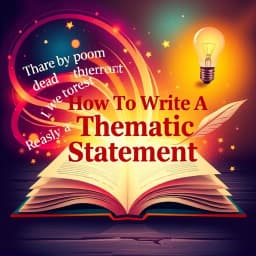
How to Write a Thematic Statement
Find this useful? Bookmark ( CTRL/CMD + D ) for quick access!
Try an example:
Literary Analysis Essays
Creative Writing Prompts
High School English Assignments
Thematic Exploration Workshops
Book Club Discussions
Film Analysis Projects
Explore Similar Tools
Recent Generations
Taco Bar Party Ideas
the amount paid directly to you. Yes it is possible in future cases to request direct payment to the provider, Rephrase and give me polished email.
Claim Email Template
we have processed the claim as per the attachments in the claim submission we have processedthe invoice for Saul Holding. We dont have invoice for the Salofalk.
Claim Email Template
this additional information is very important. this adiitional information was requested by our clinical team. Without clinical review claim not be paid so please share the below additional information
How To Write A Thematic Statement
How To Write A Thematic Statement is a powerful AI-powered writing assistant that helps users craft clear and impactful thematic statements. This innovative solution combines advanced natural language processing with user-friendly guidance to deliver concise and meaningful insights into literary themes.
Key Capabilities
- Guided Writing Prompts that help users brainstorm and refine their ideas, ensuring a strong thematic foundation.
- Real-Time Feedback on thematic statements, enabling users to enhance clarity and depth in their writing.
- Examples and Templates for various genres, providing inspiration and structure for users at any skill level.
- Customizable Suggestions tailored to specific texts or themes, allowing for a personalized writing experience.
Who It's For
Designed for students, educators, and writers, How To Write A Thematic Statement excels in academic and creative writing contexts. Whether you're preparing for a literature class or working on a personal writing project, this tool streamlines your workflow and enhances your thematic analysis.
Why Choose How To Write A Thematic Statement
What sets How To Write A Thematic Statement apart is its intuitive interface and comprehensive support, making it the ideal solution for anyone looking to articulate complex ideas clearly and effectively.
Ready to transform your writing process? Start using How To Write A Thematic Statement today and experience the difference in your literary analysis!
Enhance Your Work with How to Write a Thematic Statement
Leverage the power of AI to streamline your tasks with our How to Write a Thematic Statement tool.
Guided Writing Prompts
Receive tailored prompts that guide you through the process of crafting a thematic statement, ensuring clarity and depth.
Interactive Feedback
Get real-time feedback on your thematic statements, allowing for iterative improvements and refinement.
Thematic Exploration
Explore various themes and concepts to inspire your writing, helping you to develop a unique and impactful thematic statement.
How How to Write a Thematic Statement Works
Discover the simple process of using How to Write a Thematic Statement to improve your workflow:
Input Your Text
Begin by entering the text or literary work you want to analyze for thematic statements.
Identify Key Themes
The AI scans your text to identify recurring themes and significant ideas.
Generate Thematic Statements
Based on the identified themes, the tool generates potential thematic statements for you to consider.
Refine and Finalize
Review the generated statements, refine them as needed, and finalize your thematic statement.
Use Cases of
How to Write a Thematic Statement
Explore the various applications of How to Write a Thematic Statement in different scenarios:
Literary Analysis
Assist students and educators in identifying and articulating the central themes of literary works, enhancing comprehension and critical thinking.
Essay Writing Support
Provide guidance for students in crafting thematic statements for essays, ensuring clarity and depth in their arguments.
Creative Writing Enhancement
Help aspiring writers develop thematic statements for their stories, ensuring that their narratives convey meaningful messages.
Curriculum Development
Aid educators in creating lesson plans that focus on thematic exploration, fostering deeper discussions and engagement in the classroom.
Who Benefits from How to Write a Thematic Statement?
AI-Powered Efficiency
From individuals to large organizations, see who can leverage How to Write a Thematic Statement for improved productivity:
Students
Enhance literary analysis skills by learning to craft thematic statements for essays and projects.
Writers
Develop a deeper understanding of themes in their work, improving storytelling and narrative depth.
Educators
Teach students how to identify and articulate themes in literature, enhancing classroom discussions.
Literary Critics
Analyze and critique literary works more effectively by articulating clear thematic statements.
Frequently Asked Questions
What is a thematic statement?
A thematic statement is a sentence that expresses the central idea or message of a literary work. It encapsulates the underlying themes and can provide insight into the author's purpose.
How does the AI tool help in writing a thematic statement?
The AI tool analyzes the text and identifies key themes, motifs, and character developments, helping users formulate a clear and concise thematic statement based on the analysis.
Is the tool suitable for all types of literature?
Yes, the tool is designed to work with various genres of literature, including novels, short stories, plays, and poetry, making it versatile for different literary analyses.
Can I use the tool for academic purposes?
Absolutely! The tool is ideal for students, educators, and researchers looking to enhance their understanding of literature and improve their analytical writing skills.
Is there a limit to the length of text I can analyze?
The tool can handle a wide range of text lengths, but for optimal performance, we recommend analyzing excerpts or passages rather than entire books at once.
































